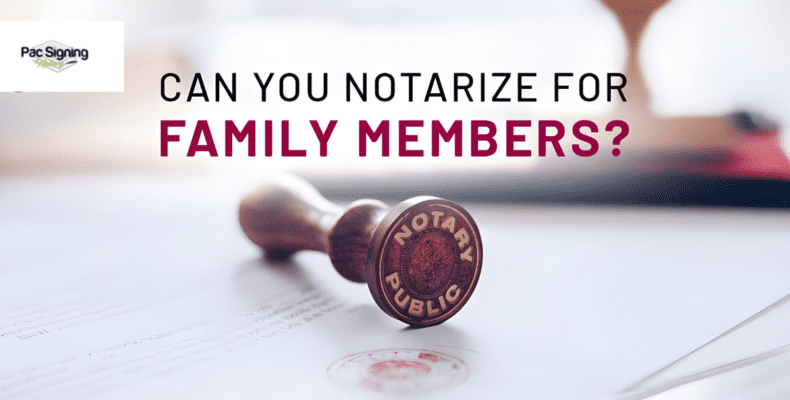Notaries public are impartial witnesses who verify the identity of signers and the authenticity of signatures on documents. They play an important role in many legal and business transactions. However, there are some restrictions on who can serve as a notary public, and one of these restrictions is on family members.
Here are some things to consider when deciding whether to have a family member notarize a document:
- What is the nature of the document? Is it a simple document, such as a power of attorney or a travel consent form? Or is it a more complex document, such as a real estate deed or a will? If the document is complex, it is generally best to have it notarized by a public notary who is not related to you.
- Who will be requiring the notarization? Some organizations, such as banks and government agencies, may not accept notarizations from family members. If you are unsure whether the notarization will be accepted, it is best to have the document notarized by a public notary.
- What are the risks of having a family member notarize the document? If the notary public is not impartial, or if they make a mistake in the notarization, the document may not be valid. This could lead to legal problems or financial losses.
If you decide to have a family member notarize a document, be sure to follow all of the applicable notary laws. For example, the signer must personally appear before the notary public and present identification. The notary public must also keep a record of all notarizations performed.
Can a family member notarize
What is a Notary Public?
A notary public is an official licensed by the state to perform notarial acts, like witnessing signatures on important documents and administering oaths. They confirm the identity of the person signing the document and make sure they are signing it voluntarily.
The main purpose of a notary is to deter fraud. Having a neutral third party verify signatures helps ensure the authenticity and integrity of important legal documents like real estate transactions, affidavits, and power of attorney forms.
Why Family Members Can’t Normally Notarize
In most states, it’s illegal for family members to notarize each other’s signatures. There are a few key reasons behind this prohibition:
The only state that allows close family member notarization is Virginia. But even there, it’s discouraged unless necessary, and only for immediate family like parents, children, siblings, or spouse.
When Family Member Notarization is Allowed?
- Notarizing their own signature:
Some states allow individuals to notarize documents they personally signed. For example, a parent could notarize their signature on a consent form for their child’s school trip.
- Notarizing employee documents:
A few states like California allow company employees to notarize papers signed by their coworkers, even if they are related. But it’s usually best to avoid this scenario when possible to prevent any conflict of interest.
- Remote online notarization:
In many states, the rules differ for remote online notarizations performed via webcam. The notary doesn’t need to be physically present with the signer, so some states are more lenient on family member notarization in these situations.
- Ministerial vs. discretionary acts:
Notarizing an already signed document (like certifying a copy) is sometimes permitted for family, while notarizations requiring discretion and judgment (like witnessing a signature) are not.
So in most cases, standard practice is to avoid having family members notarize your documents. The exceptions are narrow and limited. It’s better to be safe and use an objective notary public without any close personal ties.
Faq’s
Can I notarize my husband’s will?
In most states, you cannot notarize your husband’s will. This is because you have a financial interest in the will, and notaries are prohibited from notarizing documents for people they have a financial interest in.
Can I notarize my husband’s power of attorney?
It depends on the state. In some states, you are allowed to notarize your husband’s power of attorney if you are not named as an agent in the power of attorney. However, it is generally best to avoid notarizing documents for family members, even if it is allowed by law. This is because notaries are supposed to be impartial, and there is always the potential for a conflict of interest when notarizing documents for family members.
Can my aunt notarize my oath?
Yes, your aunt can notarize your oath, as long as she is a notary public in the state where you are signing the oath.
Can I notarize an election proxy if my husband is on the ballot?
No, you cannot notarize an election proxy if your husband is on the ballot. This is because you have a financial interest in the election, and notaries are prohibited from notarizing documents for people they have a financial interest in.
Can I notarize a document for my niece or nephew?
Some states prohibit notaries public from notarizing all family members, including nieces and nephews. Other states allow it, but it is generally discouraged.

